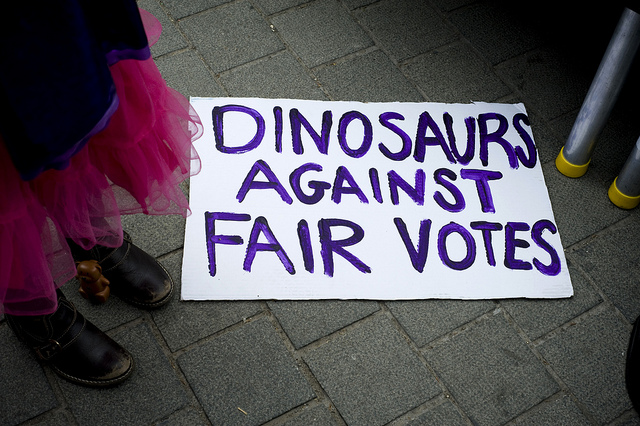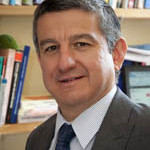Electoral fraud is less common in proportional representation systems than it is in plurality systems
What impact does the electoral system in use have on levels of electoral quality and fraud? Fabrice Lehoucq and Kiril Kolev share research which shows that plurality electoral systems lead to more ballot rigging than do proportional systems, that plurality systems are associated with inferior election quality in the Quality of Elections Database, and that electoral formulae have as much impact as social structure on whether elections are free and fair.

Credit: Jason, CC BY NC 2.0
There’s a longstanding debate about the benefits of proportional representation (PR). Because PR delivers legislative seats to parties in proportion to their share of the popular vote, it typically leads to a parliament with three or more parties. Many democracies in Europe as well as in Africa, Asia, and Latin America use this system. Its advantages – the ability to mirror diverse opinions in society – contrast with the plurality electoral system of most English-speaking democracies. In Britain, many of her former colonies, and the US, the candidate that obtains the largest number of votes – a plurality – wins the seat.
In a new study, we find that these differences in electoral formulae shape how fraudulent elections are. PR does lead parties to commit fewer infractions of electoral law than in First Past the Post Systems (FPTP), even after we control for relevant variables and exploit the advantages of most similar and most different research designs. Plurality systems foment electoral fraud because only one party can win a particular electoral district. The stakes of losing are therefore much higher than in PR systems. In FPTP systems, candidates face more incentives to prevent opposition voters from casting ballots, to tamper with voter rolls and even the ballot box, and to manipulate the tally of the vote. Winning, by even one (questionable) vote, is preferable to being shut out of parliamentary representation.
How do we know this? We subject what we can call the electoral formulae hypothesis to two sets of systematic tests. First, we take advantage of an uncommon database of more than 1,300 accusations of fraud from Costa Rica, a country where parties began fielding candidates in competitive elections in the late nineteenth century (and where franchise rights for males, 20 years or older, were universal until 1949, when women obtained the right to vote). This database extracts these charges of misconduct from the petitions to nullify electoral results, the legal complaints parties sent Congress in the aftermath of disputed elections (under the classical theory of electoral governance, parliaments certified the elections that executives [often in conjunction with local authorities] typically organized). To the best of our knowledge, electoral laws in Costa Rica are unique among nation-states in that candidates won office using either PR or FPTP in biennial elections between 1901 and 1948. Less populated districts (provinces) used plurality while more populated ones used PR in the 175 elections that took place during this period.
Second, we attempt to disprove the electoral formulae hypothesis with the Quality of Elections Database (QED), which contains information about 170 countries and the 1,046 elections they held between 1975 and 2004. It relies upon US State Department assessments of electoral misconduct to create a five-point scale of election problems in a worldwide set of countries. It also uses variables from standard datasets in comparative politics, including the classification of electoral formulae produced by the Institute for Democracy and Electoral Assistance (IDEA), Matt Golder’s and the Inter-Parliamentary Union (PARLINE) classification of elections, and several datasets of ethnic fractionalization. While QED permits assessing the impact of electoral laws across a diverse set of institutional and social contexts, the subnational test maximizes similarities between units of analysis. That formulae and social structure vary in Costa Rica – in an otherwise homogenous environment – minimizes problems of endogeneity that bedevil research in comparative politics.
This finding has several implications for the study of electoral laws and of electoral fraud. First, electoral laws do shape something as apparently as random as fraud. Candidates and parties denounce the partisan manipulation of election returns in response to institutional incentives unleashed by institutional arrangements. Second, our analysis shows that plurality elections are not only associated with two-party systems, as stated by French political scientist Maurice Duverger, but also with more fraudulent elections. Our finding thus is another instance of how a basic feature of electoral laws – electoral formulae – shapes a fundamental fact of political competition.
Second, our statistical results also remind us that social context counts. More unequal or stratified societies do encourage parties to manipulate elections. As the stakes of losing office increase, parties are more likely to engage in electoral subterfuge and to accuse their rivals of ballot-rigging. Regardless of the nature of their institutions, highly divided societies are more prone to running low quality elections. Nothing in our research suggests that electoral laws offer an elixir for such places, though our findings suggest that proportional systems will help improve the quality of elections. We also find that the effects of formulae are slightly larger than the effects of social structure, suggesting that electoral reform can substantially improve the quality of elections.
Finally, our results reinforce the finding not only of the diverse impacts of electoral formulae, but also of its ability to contribute to moderation in politics. Duverger’s powerful insight, for example, has been generalized to show that plurality electoral laws are associated with centre-right party systems, with smaller welfare states and more inequality (Iversen and Soskice, 2006), and even lower consumer prices. An entire body of research ignited by Arend Lijphart argues that proportional electoral systems generates more satisfied citizens and higher quality democracy ( according to Gerring and Thacker, Pippa Norris, and Reynolds). Our own findings contribute to this last research area, reinforcing the point that electoral formulae are part of an institutional matrix that shapes how peaceful political competition can or cannot be.
—
Note: This article gives the views of the author, and not the position of Democratic Audit, nor of the London School of Economics. Please read our comments policy before posting.
—
 Fabrice Lehoucq is Associate Professor in the Department of Political Science. University of North Carolina, Greensboro.
Fabrice Lehoucq is Associate Professor in the Department of Political Science. University of North Carolina, Greensboro.
 Kiril Kolev is Assistant Professor of Politics & International Relations at Hendrix College
Kiril Kolev is Assistant Professor of Politics & International Relations at Hendrix College





 Democratic Audit's core funding is provided by the Joseph Rowntree Charitable Trust. Additional funding is provided by the London School of Economics.
Democratic Audit's core funding is provided by the Joseph Rowntree Charitable Trust. Additional funding is provided by the London School of Economics.
Electoral fraud is less common in proportional voting systems than in plurality/majoritarian ones: https://t.co/oW2gnnxt6Y
Electoral fraud less common in proportional representation system than it is in plurality systems https://t.co/G0cIiUizVb
Learnings 4 #India
MT @democraticaudit: Electoral fraud less common in proportional representation systems than in plurality systems https://t.co/YBfi0qgNQt
Elections under PR tend to be less fraudulent compared to plurality systems.. Interesting! https://t.co/5njMRHZOIK via @democraticaudit
@FairVoteCanada Electoral fraud is less common in proportional representation systems via @PJDunleavy #cdnpoli https://t.co/q4t4U1JLAs
PR less likely to result in fraud than FPTP, say Fabrice Lehoucq and @hendrix_politic in @democraticaudit : https://t.co/Ex43r1fN5F
Electoral fraud is less common in proportional representation systems than it is in plurality systems https://t.co/vTtpTmitjn #Option2Spoil
Electoral fraud is less common in proportional representation systems than it … – Democratic Audit UK https://t.co/Y2T1CVmDLL
Electoral fraud is less common in proportional representation systems than it is in plurality systems https://t.co/7GWovYAT4P
Electoral fraud is less common in proportional representation systems than it is in plurality systems https://t.co/zi305dwt2t